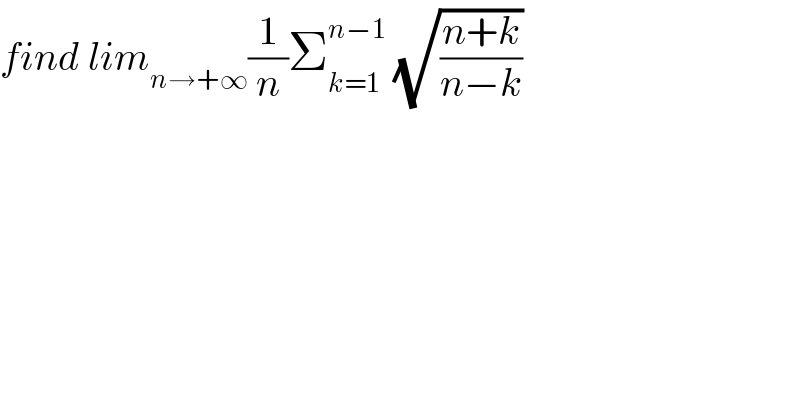
Question and Answers Forum
Previous in Relation and Functions Next in Relation and Functions
Question Number 34433 by abdo mathsup 649 cc last updated on 06/May/18

Commented by math khazana by abdo last updated on 06/May/18
![let put S_n = (1/n) Σ_(k=1) ^(n−1) (√((n+k)/(n−k))) S_n = (1/n) Σ_(k=1) ^(n−1) (√((1+(k/n))/(1−(k/n)))) ⇒ lim_(n→+∞) S_n = ∫_0 ^1 (√((1+x)/(1−x))) dx changement x= cost give ∫_0 ^1 (√(((1+x)/(1−x)) )) dx = −∫_(π/2) ^0 (√(((cos^2 ((t/2)))/(sin^2 ((t/2)))) )) sint dt = ∫_0 ^(π/2) cotan((t/2)) sint dt = ∫_0 ^(π/2) ((cos((t/2)))/(sin((t/2)))) 2sin((t/2))cos((t/2)) dt = ∫_0 ^(π/2) 2 cos^2 ((t/2))dt = ∫_0 ^(π/2) (1+cost)dt = (π/2) +[sint]_0 ^(π/2) = 1 +(π/2) ★ lim_(n→+∞) S_n = 1+(π/2) ★](Q34470.png)
Answered by arnabmaiti550@gmail.com last updated on 06/May/18
![lim_(n→∞) (1/n)Σ_(k=1) ^(n−1) (√((n+k)/(n−k))) =lim_(h→0) hΣ_(k=1) ^(n−1) (√((1/h+k)/(1/h−k))) =lim_(h→0) hΣ_(k=1) ^(n−1) (√(((1+kh)/(1−kh)) )) as h→0 h≠0 =lim_(h→0) h[ Σ_(k=0) ^(n−1) (√((1+kh)/(1−kh)))−(√((1+0.h)/(1−0.h))) ] =lim_(h→0) h Σ_(k=0) ^(n−1) (√((1+kh)/(1−kh)))−lim_(h→0 ) h =∫_(0 ) ^( 1) (√((1+x)/(1−x)))dx−0 =∫_0 ^( 1) ((1+x)/(√(1−x^2 )))dx =∫_(0 ) ^( 1) (dx/(√(1−x^2 )))+∫_0 ^( 1) ((x dx)/(√(1−x^2 ))) =[sin^(−1) (x)]_0 ^1 +∫_0 ^( (π/2)) ((sinθ cosθ dθ)/(cosθ)) [put x=sinθ] =(π/2)+∫_(0 ) ^( (π/2)) sinθ dθ =(π/2)+[−cosθ]_0 ^(π/2) =(π/2)+1](Q34451.png)
